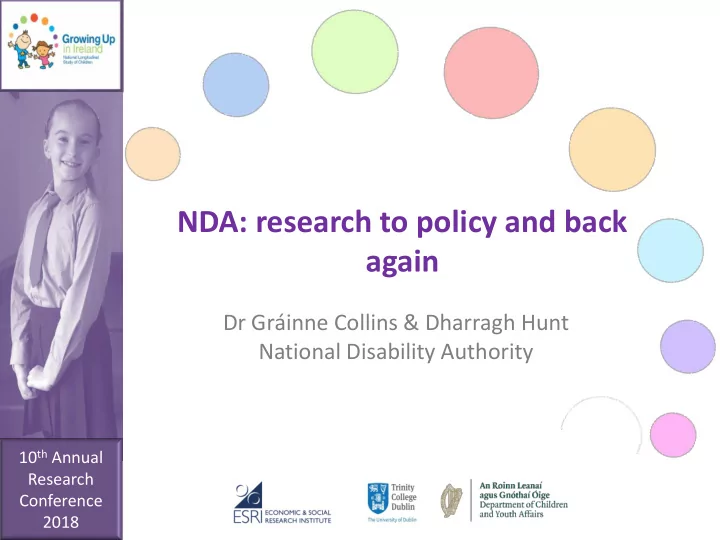

NDA: research to policy and back again Dr Gráinne Collins & Dharragh Hunt National Disability Authority 10 th Annual Research Conference 2018
2
Expectations of parents • On page 137 “Table 5.3 shows, …, that children in all other SEN groups are substantially and significantly less likely to be expected to study for a degree.” • We know that one of the biggest predictors of educational (therefore work) outcomes are parental expectations – E.g Smyth (2010) Understanding Parental Influence on Educational Outcomes Among 9 Year Olds in Ireland: The Mediating Role of Resources, Attitudes and Children’s Own Perspectives • Red light flashed for the NDA
• So we know expectations are important and parents of a child with a disability have lower expectations… 4
Expectations • Banks et al found that, in some cases, parental expectations were lower than might be expected based on the actual academic achievement of the child • Expectations were influenced by: – Child’s academic development (lower scores lower expectations) – Gender (expect less of boys) – Educational attainment of the parents (less expectation if you haven't gone to third level) – Parent-child relationship (conflict lowers expectations)
Expectations • I was working with the HSE on a completely unrelated project and mentioned this research to the person I was working with – Anne Melly • For Anne that was a ‘Ha!’ moment because in parallel the HSE was engaging in the Comprehensive Employment Strategy and were trying to increase the employment of people with a disability • Anne convened a group of Allied Health Professionals who conducted research among their HSE members. This showed: – Employment came up when AHP were dealing with PWD but a) AHP didn’t know how to guide people but b) AHP were happy to talk about future careers • Result will be guidelines on signposting people for careers guidance.
• That wasn’t a straight line from research top policy making but it’s even more nebulous than that: – Every time the NDA interacts with education or parents groups we know that the ability of children with a disability is being underestimated – Every time the NDA interacts with the media or communications companies we’ll stress the need for positive representations of people with disability
Review of Overage Exemptions for ECCE • ECCE ‘free pre - school year’ introduced in 2010 • No supports for children with disabilities in ECCE • Some flexibility on attendance pattern (spreading ‘year’ over 2 years) and on starting age - ECCE ‘Overage Exemptions’ • Approx. 500 apply & receive ‘Overage Exemptions’ • AIM (Access and Inclusion Model) rolled out in September 2016 • ECCE expanding to 2 years from September 2018 • Decision to cease offering ‘Overage Exemptions’ • Decision paused, review, hear from parents • DCYA and DES asked NDA to conduct the review
Review of Overage Exemptions for ECCE • Initially considered using GUI data • Reviewed admin data, redacted OE application files, available literature • Investigated administrative procedures in other countries • Engaged with stakeholders, Open Policy Debate • Surveyed parents who had received an OE in 2017 – 2018 • Conducted interviews with some of these parents • Strengths - information on a very specific issue; very rich information on parents’ views and experiences. Limitations - small nos., no comparison, point in time • Transitions emerged as a key issue
Smyth, The Transition to Primary Education: Insights from GUI Study, 2018
Smyth, The Transition to Primary Education: Insights from GUI Study, 2018 • Other factors being equal, those with disabilities start school significantly later than other children (pg. 27) • The greatest transition difficulties are found among children with disabilities (pg. 57) • Did we come full circle on relevance of GUI to Review questions? • NCCA / Smyth report emerges as an important source of evidence for framing the Review’s findings in a broader context • Research – policy relationship? Non-linear, emergent
Linear policy making
Actual policy making
Critical factors • Research gets to the right desk • Timeliness • Personal contacts • Often a need to triangulate original research • or a need to narrow the focus
Recommend
More recommend